Sun 20 Jun 2010
A Review by Jim Widner: JOHN DUNNING – Two O’Clock, Eastern Wartime.
Posted by Steve under Old Time Radio , Reviews[7] Comments
JOHN DUNNING – Two O’Clock, Eastern Wartime. Scribner, hardcover, 2001. Paperback reprint: Pocket, 2002.
In John Dunning’s 2001 thriller, Two O’Clock, Eastern Wartime, one of the characters says of radio:
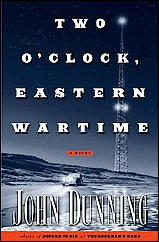
Radio — dramatic radio — in a sense is one of the characters in the book. One of the main characters, Jordan Ten Eyck, is a writer who discovers the power of dramatic radio writing while he finds himself in the midst of a cracker of a thriller involving Nazi spies, murder and mystery surrounding a fledgling radio station, WHAR, in fictional Regina Beach, New Jersey. The time is 1942.
Dunning, as most old time radio fans know, is no stranger to radio or old-time radio. He is the author of two encyclopedias of the Golden Age of Radio: Tune in Yesterday and On the Air: The Encyclopedia of Old Time Radio.
He also was the host of a radio show, Old Time Radio, in Denver for many years. But Dunning also is a writer of mystery thrillers. This Nero Wolfe Award winner is the author of several other suspense stories, among them Booked to Die and The Bookman’s Wake.
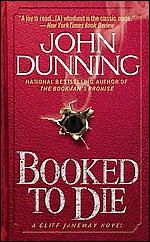
Two O’Clock, Eastern Wartime tells the story of Jack Dulaney, aka Jordan Ten Eyck, and Holly Carnahan. The two were in love years ago but drifted apart after the death of their friend and Jack’s rival, Tom Rooney. Now Jack wants to find Holly again, and with the help of an often-inebriated radio actor friend, Marty Kendall, he begins his trip across America to Pennsylvania, where Tom, Jack, and Holly all lived at one time and was Holly’s last known address.
But Jack encounters only suspicious characters and death along the way and, eventually, finds himself in Regina Beach, New Jersey at radio station, WHAR, looking for work and Holly’s father, Tom Carnahan. It is there that Jordan begins his career as a radio writer and with the WHAR radio community — Rue, Pauline and Hazel, radio actresses; Livia, a sound artist; and Waldo, creator of the magnificent black program, Freedom Road.
Woven into the story is Jordan’s journey into the discovery of the power of radio drama:
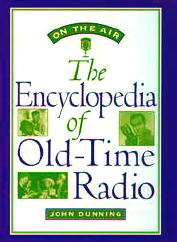
Jordan discovers the power of radio and nothing, it seems, can hold back his thirst for creation as scripts and ideas continue to flood out of him. Later, he discovers that he can move beyond even that thirst by directing his own work. Dunning, through Jordan, makes the power of radio drama come alive.
All the thrill and excitement of the production both as listener as well as participant is explored. Meanwhile, Jordan becomes absorbed in the mystery of what became of Holly’s father, who disappeared from the radio station before their arrival and of one of the radio actor’s, March Flack, who disappeared in 1936. And what about the station’s seemingly ominous owner, Mr. Harford?
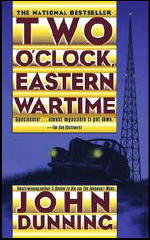
Jordan begins to write powerful and politically explosive scripts to the encouragement of the radio owner and management who hope to return the station to a glorious time before the war. His excitement begins to affect the actors and technicians as production reaches fever pitch.
Surrounding this is Jordan the detective trying to find out what really happened at the station several years before. Using the power of his radio scripts, he attempts to seek out the truth from those who were there.
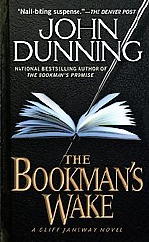
Jordan and Holly both become targets and become wrapped into the intrigue endangering them. The mystery of the German Schroeder boys, George and Peter, the attempts on his life, the mystery around the radio writer, Paul Kruger and his script about the Boer war all need answers for Jordan. The book is full of wonderful characters with stories to tell, who carry their own sense of mystery with them.
There are a number of writers who have written stories framed around early radio, but if you are both a fan of old time radio as well as a mystery thriller fan, then this book will definitely entertain.
John Dunning is a superb writer. As a mystery writer, he is new to this reviewer, but he is certainly an author I will seek out again.
Editorial Comment: Jim Widner has long been involved with Old Time Radio, both as a collector and as a researcher, author and indexer. His web site is devoted to OTR in a historical context at Radio Days. For several years he has also produced a podcast called the Radio Detective Story Hour. Follow the links to each.
June 20th, 2010 at 10:25 pm
Sadly relatively few books in the genre (or out of it) have used the promising background of vintage radio drama or a radio station and broadcast for mysteries. This was a natural for a mystery, and Dunning the perfect choice to write it.
Donald Henderson’s A VOICE LIKE VELVET features a hero who is BBC announcer with a side line as a daring cracksman, Simon Brett’s THE DEAD SIDE OF THE MIKE feature bibulous actor Charles Paris on radio, Val Gielgud and Holt Marvell’s DEATH AT BROADCASTING HOUSE, Ernest Dudley’s CONFESS TO DR. MORELLE, Fredric Brown’s A PLOT FOR MURDER, Xantippe’s DEATH CATCHES UP WITH MR. KLUCK (filmed as a Crime Club entry), and to some extent John Dickson Carr’s NINE WRONG ANSWERS are a few titles with a radio background.
Sadly Carr and Gielgud who collaborated on so much radio drama for the BBC never got together for a literary mystery with the background. Ernest Dudley wrote the BBC’s Armchair Detective mysteries. Simon Brett still writes a good deal for the BBC.
But this one is great fun and a good mystery — a splendid example of Dunning’s talents.
June 21st, 2010 at 8:01 am
Crippen & Landru collected some of Ellery Queen’s radio plays in The Adventures of the Murdered Moths & Other Radio Mysteries. More recently they published The Casebook of Gregory Hood by Anthony Boucher & Denis Green. They also did a collection of Carr & Gielgud radio plays.
All are worth reading.
June 21st, 2010 at 3:34 pm
Mysteries, including movies, taking place in or around radio studios isn’t quite the same thing as collections of radio plays, but I enjoy the latter too.
Besides the ones above, I have a collection of Shadow radio plays and other small paperback of assorted radio mysteries, both very entertaining, especially if you can “hear” the actors as you’re reading their lines.
And sometimes the sound effects are even better than what you’d hear if you were listening to the program itself.
June 21st, 2010 at 4:47 pm
Sadly relatively little radio drama has been collected — which is odd because radio plays by their nature are easier and more pleasurable to read than most screenplays.
During the heyday you not only had writers like Carr, Gielgud, and Boucher writing for radio, but Leslie Charteris, Ernest Dudley, Francis Durbridge, and many others — unlike television or movies it was considered a natural extension of writing in general.
If you can find it look up Carlton E. Morse’s STUFF THE LADY’S HATBOX, written in his eighties it’s a novel based on his I LOVE A MYSTERY heroes, Jack Packard, Doc Long, and Reggie York and their Five Star Detective Agency. It was self published, and the typography looks disturbingly like a manuscript, but not a bad book and certainly fun for anyone who loved the series. Sadly it doesn’t have a radio background, but it should still fit here.
DEATH CATCHES UP WITH MR. KLUCK by Xantippe, mentioned above, was filmed for the CRIME CLUB series (LADY IN THE MORGUE, THE WESTLAND CASE …) as DANGER ON THE AIR. It’s available (or was) on the gray market. Xantippe was Edith Meiser who wrote and produced radio drama including Sherlock Holmes.
August 22nd, 2010 at 2:09 pm
Some of the reasons old radio hasn’t been collected or archived in a complete form is that it was never recorded. At times the “network” was scripts being mailed out to various stations all of whom produced the play for their local audience with local casts. Wild!
I enjoyed Two O’Clock very much, it had a mesmerizing atmosphere, spooky, obsessive. The sense of place was familiar and new at the same time and the radio production elements a great deal of fun with a bit of romance thrown in. I have had the chance to produce, write, direct, some 70 “radioish” audio dramas, many of them on the east coast and the book took me back to the days when I was doing one every other month, from script to edit. We never had the opportunity to work live or with an orchestra, or even in a state of the art facility (for the time) like you read about in this novel but the feeling of the speed of creation, the rush of getting it done are all right on. Dunning understands one of the elements that I believe only a few in the great days of radio ever understood … the potential for intimacy in the genre. At the time “acting” still hearkened back to it’s theatrical roots and a sense of having to hit the back row unnecessarily permeated both Radio and Film. In the hands of an actor and engineer who understand the intimate relationship of actor and microphone a drawn breath can send shudders through the audience. Radio is the biggest close up in the world. Radio demands the most imagination from an actor too. There are no sets, no costumes, no props and little movement … and actors use movement to ingrain a performance into their psyche. Subtle vocal performance separates the men from the boys, acting-wise. Though subtlety has never been what old radio dramas were known for Dunning realizes this fact as well as anyone who has ever had a vision of what is possible in the medium.
What a wonderful fantasy … I’d have given my left ear (stereo not having come into favor yet) for a chance to work at Dunning’s fictional WHR!
I’m at work on what will probably be my last radio drama at the moment, going up river with Mike Kardec and the Lacklan’s in an updated version of The Diamond of Jeru and it’s a bit of a bittersweet journey, redoing a story I felt a desperate need to revisit after the film and going with my production team one more time into the depths (dramatic enough for you?) of the blind art of audio drama like we did when we were in our twenties. To use a phrase from Charles Schultz … “Sigh.”
March 1st, 2011 at 11:43 am
Was sad to read that old time radio did not record. My grandfather, Marsden Todd Brooks,played in The Seaside Hotel Trio (cellist)from Station WHAR there, in the 1920s. Have a photo of the Trio playing there, but would be great to retrieve a recording!
November 14th, 2011 at 8:56 am
Radio plays of yore stirred in the listener the most dynamic of human emotions, imagination. But two oclock eastern wartime left a lot to be desired in the imagination department.
Look, radio enthralled because of its split second timing, the emotions stirred by its actors’ inflections, and of course, good writing. But I didn’t get the sense of “being behind the mike” or “sitting in the booth” from this book – about which I think the author, as a professed radiophile, is allegedly knowledgeable.
The off-mike camaraderie of the actors, technicians and the owner was contrived.
And as for the plot, I got no sense of “evil” from the guy who turned out to be the villain, no sense of foreshadowing, no sense of what really compelled him to act as he did, or why. Further, the characters of Holly and Harford were initially touted as complex, but they were woefully underdeveloped in the plotline.